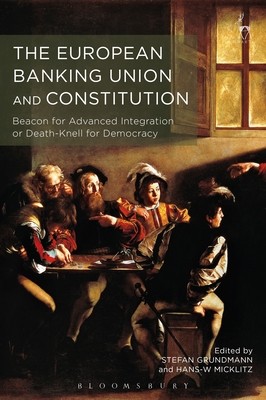
- We will send in 10–14 business days.
- Publisher: Hart Publishing
- Year: 2019
- Pages: 336
- ISBN-10: 1509907548
- ISBN-13: 9781509907540
- Format: 15.8 x 23.6 x 2.5 cm, kieti viršeliai
- Language: English
- SAVE -10% with code: EXTRA
The European Banking Union and Constitution (e-book) (used book) | bookbook.eu
Reviews
Description
In 2012, at the height of the sovereign debt crisis, European decision makers pushed for developing an 'ever closer union' with the formation of a European Banking Union (BU). Although it provoked widespread debate, to date there has been no coherent discussion of the political and constitutional dimensions of the European Banking Union. This important new publication fills this gap. Drawing on the expertise of recognised experts in the field, it explores banking union from legal, economic and political perspectives. It takes a four-part approach. Firstly, it sets the scene by examining the constitutional foundations of banking union. Then in parts 2 and 3, it looks at the implications of banking union for European integration and for democracy. Finally it asks whether banking union might be more usefully regarded as a trade-off between integration and democracy. This is an important, timely and authoritative collection.
EXTRA 10 % discount with code: EXTRA
The promotion ends in 22d.02:44:14
The discount code is valid when purchasing from 10 €. Discounts do not stack.
- Publisher: Hart Publishing
- Year: 2019
- Pages: 336
- ISBN-10: 1509907548
- ISBN-13: 9781509907540
- Format: 15.8 x 23.6 x 2.5 cm, kieti viršeliai
- Language: English English
In 2012, at the height of the sovereign debt crisis, European decision makers pushed for developing an 'ever closer union' with the formation of a European Banking Union (BU). Although it provoked widespread debate, to date there has been no coherent discussion of the political and constitutional dimensions of the European Banking Union. This important new publication fills this gap. Drawing on the expertise of recognised experts in the field, it explores banking union from legal, economic and political perspectives. It takes a four-part approach. Firstly, it sets the scene by examining the constitutional foundations of banking union. Then in parts 2 and 3, it looks at the implications of banking union for European integration and for democracy. Finally it asks whether banking union might be more usefully regarded as a trade-off between integration and democracy. This is an important, timely and authoritative collection.


Reviews